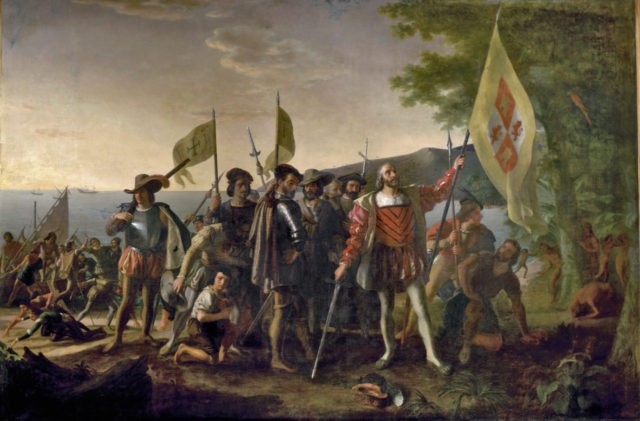Mary Grabar, a scholar at the Alexander Hamilton Institute in Clinton, New York, recently published a book that aims to debunk the revisionary scholarship of leftist historian Howard Zinn. In her book, Grabar takes aim at what she calls Zinn’s lies about Christopher Columbus, which have in part fueled the outrage on campus against the Columbus Day holiday.
Leftist historian Howard Zinn’s book, A People’s History of the United States, is frequently assigned by college history professors. Zinn’s book has sold two million copies since its initial publication in 1980. The book has been hailed by progressives as a needed correction to an uncritically pro-America narrative in other history textbooks. Conservatives have accused Zinn, and the book, of having an irrational zeal for lifting America’s sins over its triumphs.
This week, the College Fix published an excerpt from Mary Grabar’s book “Debunking Howard Zinn.” Grabar makes the case that Zinn intentionally misleads his readers on the topic of Christopher Columbus by omitting relevant portions of Columbus’ writing. Zinn’s misleading writing combined with the book’s popularity on campus has resulted in attacks on Columbus Day and calls to replace it with “Indigenous Peoples’ Day.”
Take for example, the following paragraph from Zinn’s best-seller:
Arawak men and women, naked, tawny, and full of wonder, emerged from their villages onto the island’s beaches and swam out to get a closer look at the strange big boat. When Columbus and his sailors came ashore, carrying swords, speaking oddly, the Arawaks ran to greet them, brought them food, water, gifts. He later wrote of this in his log: ‘They . . . brought us parrots and balls of cotton, and spears and many other things, which they exchanged for the glass beads and hawks’ bells. They willingly traded everything they owned. . . .
Grabar claims that Zinn intentionally placed the ellipses to deceive readers. Why? Grabar claims that Zinn omitted specific text from the explorer’s journal because that text was not convenient to his narrative.
But Zinn’s most crucial omissions are in the passage from Columbus’s log that he quotes in the very first paragraph of his People’s History. There he uses ellipses to cover up the fact that he has left out enough of Columbus’s words to deceive his readers about what the discoverer of America actually meant. The omission right before “They would make fine servants” is particularly dishonest. Here’s the nub of what Zinn left out: “I saw some who bore marks of wounds on their bodies, and I made signs to them to ask how this came about, and they indicated to me that people came from other islands, which are near, and wished to capture them, and they defended themselves. And I believed and still believe that they come here from the mainland to take them for slaves.”
Breitbart News reported last week that 69 percent of students are in favor of abolishing Columbus Day. Those that were in favor of the Columbus Day ban argue that “the tradition of celebrating Christopher Columbus comes with an inherent celebration of genocide, violence, and colonization.”

COMMENTS
Please let us know if you're having issues with commenting.